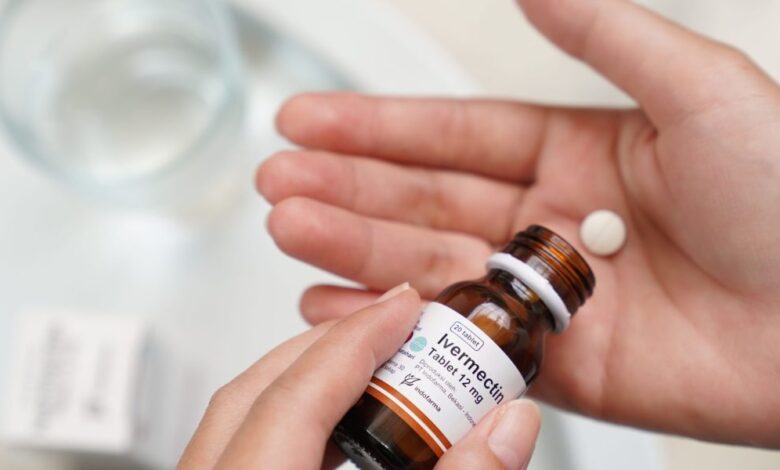Ivermectin is being touted as a cure for COVID and cancer. Here’s what science says


Among the many recommendations floating around during early COVID times—along with the now-disproven hydroxychloroquine, and President Donald Trump’s suggestion that scientists study UV rays and bleach injections—was ivermectin, a drug approved by the U.S. Food and Drug Administration only to treat some parasitic worms (and also used to treat parasites in animals). U.S. outpatient prescriptions for the drug, according to a recent study, increased tenfold above pre-pandemic rates—despite strong evidence that disproves its effectiveness in treating COVID.
Before becoming health secretary, Robert F. Kennedy Jr. name-checked the drug in an October rant on X about the “FDA’s war on public health” and its suppression of many treatments, also including raw milk, hyperbaric therapies, clean foods and “anything else that advances human health and can’t be patented by Pharma.”
And in January, actor Mel Gibson, speaking as a guest on the popular Joe Rogan Experience podcast, said that the drug had helped three friends with stage-4 cancer become cancer-free. “This stuff works, man,” he told Rogan (who had said he took ivermectin, among other remedies, after testing positive for COVID in 2021).
Now that episode, seen by more than 10 million, appears to have reignited interest in the drug and fueled misinformation across social media, worrying many experts.
The Canadian Cancer Society quickly posted a rebuttal on X. “During Joe Rogan’s podcast on January 9, Mel Gibson promoted drugs that are not scientifically proven cancer treatments,” it read. “Misinformation on cancer treatment is dangerous, cruel, irresponsible and gives false hope to people with cancer and their loved ones.”
Still, despite the warnings about ivermectin’s lack of efficacy and a risk of toxicity that could cause side effects from coma to death, believers have worked to make the drug more accessible: Arkansas just legalized over-the-counter ivermectin, a Georgia senator just introduced legislation to do the same in that state, and in the Texas senate, a bill has been introduced that would protect doctors who prescribed ivermectin (and hydroxychloroquine) for COVID from being punished by the state’s medical board.
Other states, including Louisiana, West Virginia, and Kentucky have also introduced legislation to approve ivermectin as an over-the-counter drug.
Below, everything we know about ivermectin.
Ivermectin for COVID
In a 2022 systematic review and meta-analysis of 25 randomized controlled trials, ivermectin—so effective in the fight against parasitic diseases that it snagged the Nobel Prize in 2015 for the two scientists who discovered its powers—did not show an effect in reducing mortality or mechanical ventilation; it also did not show much in the way of adverse effects, though researchers said there was a “very low quality of evidence” regarding those effects.
A 2023 clinical trial on 1,432 largely vaccinated outpatients with mild to moderate COVID saw a median recovery time of 11 days with the ivermectin and 12 days with the placebo. Therefore, the study concluded, “These findings do not support the use of ivermectin among outpatients with COVID-19.”
A 2024 clinical trial, meanwhile, showed that ivermectin used on patients hospitalized with COVID had no significant effect on clinical symptoms—though it did result in “statistically significant lower viral load in patients with mild to moderate Covid-19.”
The FDA notes, in information on its website last updated one year ago, that it has not authorized or approved ivermectin for use in preventing or treating COVID-19 in humans or animals. Animal versions of ivermectin are different from human formulations, it stresses, noting, “The FDA has received multiple reports of patients who have required medical attention, including hospitalization, after self-medicating with ivermectin intended for animals.”
Further, FDA says it has determined “that currently available clinical trial data do not demonstrate that ivermectin is effective against COVID 19 in humans.”
Possible risks of taking ivermectin, particularly in large doses, can be dangerous, according to the FDA—which warns it can interact with other medications, including blood thinners. Overdoses are possible, and can cause nausea, vomiting, diarrhea, low blood pressure, allergic reactions, dizziness, balance problems, seizures, coma, and even death.
What about ivermectin for cancer?
The Associated Press disproved, in 2023, a popular Facebook claim that ivermectin was being withheld as a magic cancer cure. It did explain that there had been early studies exploring the role that ivermectin might play, if any, in slowing the growth of cancer cells or treating tumors.
Dr. Susanne Arnold, associate director for clinical translation at the Markey Cancer Center in Kentucky, told the AP that some preclinical studies looked at how ivermectin slowed cancer cell growth in labs, and that results were interesting. But, she stressed, “I know of no reports of clinical trials that yielded successful results in humans with cancer.”
Additionally, Dr. Peter P. Lee, chair of the immuno-oncology department at City of Hope Comprehensive Cancer Center in California, told the AP he had studied ivermectin in combo with a specific antibody for treating breast cancer—and saw positive results in mice. He was preparing to run a clinical trial in humans (now active), but said, “Certainly by itself ivermectin is not a cure or even an effective treatment for breast cancer.”
Studies have shown it has anti-cancer potential. But larger, randomized clinical trials are needed, Dr. Skyler Johnson, a radiation oncologist at the University of Utah Huntsman Cancer Institute, told the New York Times. That’s because a drug working in animals doesn’t necessarily mean it will work in people. There are “hundreds of medications that look to be promising in a preclinical setting” every year, he said. “The vast majority of those will never be shown to be effective in humans.”
More on cancer:
- Cancer deaths are down, but rates in women under 50 are rising
- The number one diet change to lower your cancer risk, according to experts
- I tried the American Cancer Society’s new cancer risk assessment. Here’s what I learned
This story was originally featured on Fortune.com
https://fortune.com/img-assets/wp-content/uploads/2025/04/GettyImages-1235006723-e1743539382996.jpg?resize=1200,600
2025-04-02 15:00:06





